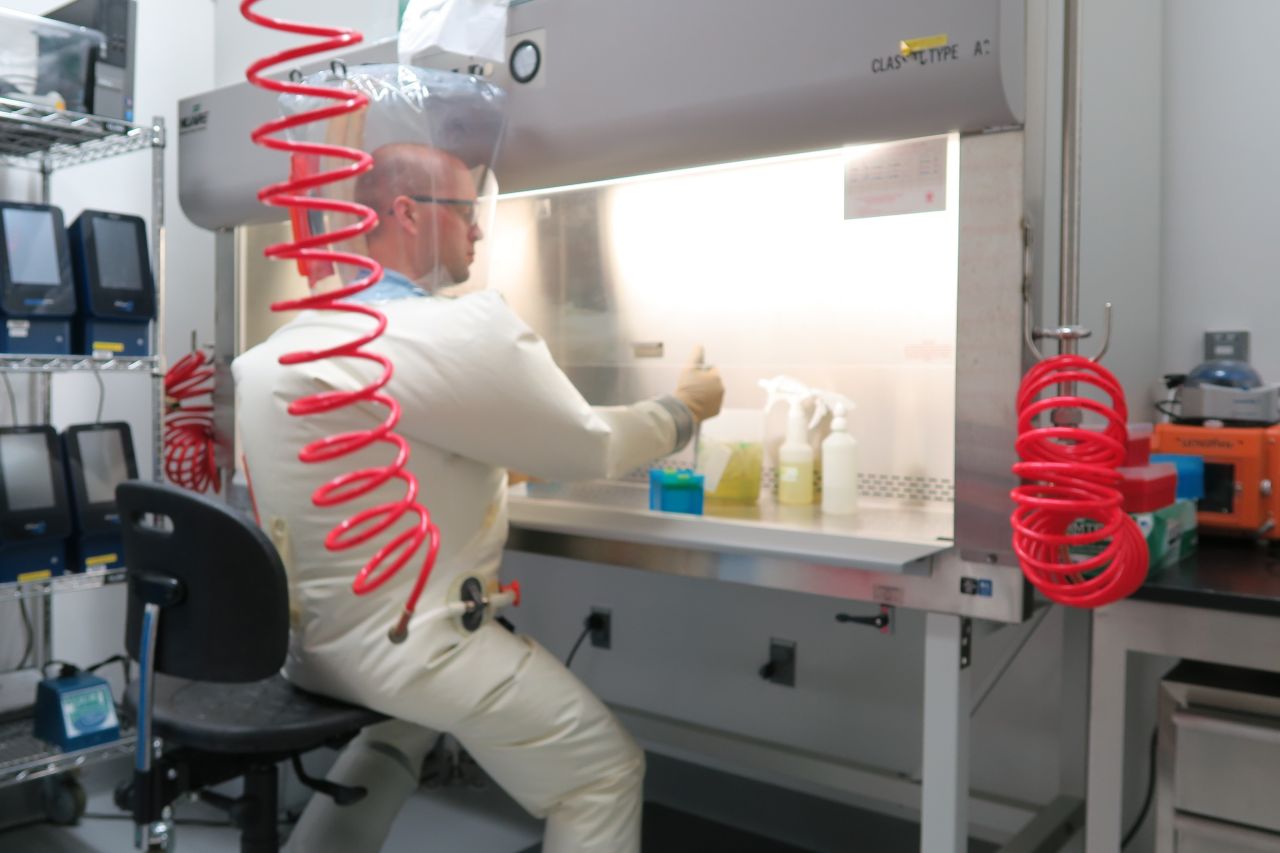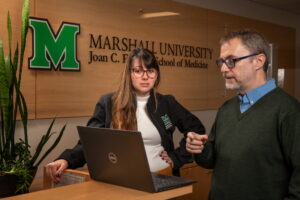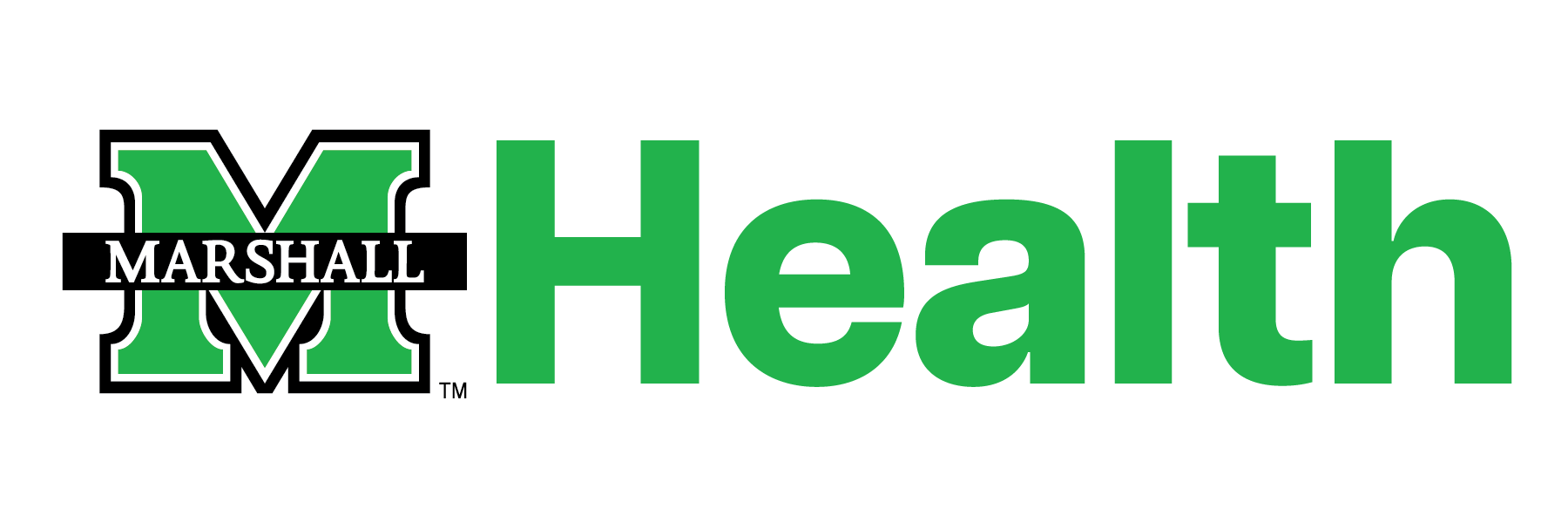Shaping Tomorrow’s Physician-Scientists
Marshall’s MD/PhD program provides a unique path to those who dare to blend the art of healing with the pursuit of scientific discovery.

Physicians and scientists have long been at the forefront of groundbreaking discoveries that shape modern health care. But a unique path awaits those who dare to embody both roles, combining medical expertise with the drive to explore new frontiers in scientific research. At Marshall University, the MD/PhD program is designed to foster a new generation of physician scientists — individuals uniquely trained to ask the right questions, investigate complex medical problems and push the boundaries of both clinical practice and biomedical research. In a world in which the boundaries between clinical practice and scientific discovery are increasingly blurred, Marshall University’s MD/PhD program is equipping a new generation of physician-scientists to lead the way.
Jeremiah Matson, MD, PhD (’22), a graduate of the program and now a fellow in the Division of Infectious Diseases at the University of Utah, said his journey, like that of many physician-scientists, was marked by a series of significant moments that solidified his path.
“I came to the realization that I really enjoy seeking new medical knowledge.” Dr. Matson said. “When you start preparing for medical school, you realize there is a lot of unfinished science, and there are many questions to ask and answers to be found.”
This desire to explore the unknown is a defining trait of physician-scientists. While medical students often focus on learning established protocols, MD/PhD students are encouraged to challenge existing paradigms, ask unanswered questions and push the frontiers of medicine and science alike.
Dr. Matson said one of his most powerful experiences in the program came during the COVID-19 pandemic. As he was completing the final year of his PhD, he found himself working in a lab that had already established itself as a leader in coronavirus research.
Dr. Matson explained: “It was an intense experience — working on the cutting edge of the outbreak from a scientific standpoint and then returning to medical school at the end of 2020 to care for patients with the very disease I had been studying.”
That direct application of laboratory experience to clinical care was when Dr. Matson clearly saw the intersection of science and medicine, he said. He noted that, while the program is extremely rewarding, one of its strengths — the flexibility to pursue atypical research opportunities — challenged him both academically and personally.
“I spent my four years of PhD training at the National Institutes of Health (NIH), which hadn’t been done before at Marshall,” Dr. Matson said. “But the program was incredibly supportive. I also got married just before starting, and we had four kids while I was completing my degree. Balancing personal life with the demands of medicine and science was a huge challenge, but one that prepared me well for the rest of my career.”
According to Richard D. Egleton, PhD, professor and assistant dean of biomedical research education and director of the MD/PhD program at the Joan C. Edwards School of Medicine, such flexibility is key to the program’s success. 
“When I assumed leadership of the program in 2016, one of my goals was to ensure a support structure that equips our students for success,” Dr. Egleton said. “We consistently communicate with our students to make sure they’re getting out of the program what they need. The impact of Marshall University’s MD/PhD program extends beyond the individual. Our students tend to promote research among their peers in medical school; they become mentors and provide unique insights into the research process that help foster a more inquisitive mindset in other students.”
Dr. Matson’s career trajectory is a testament to this. As he continues his training in a physician-scientist residency and fellowship program, Dr. Matson is focused on emerging viruses like Ebola, building on the work he began at Marshall. His long-term goal is to lead an independent research program focused on emerging viruses, contributing to both the scientific understanding of these pathogens and the development of new treatments.
“I think physician-scientists are uniquely positioned to shape the future of health care,” Dr. Matson said. “We have broader training in both medicine and science, which allows us to conduct high-yield investigations that are directly informed by clinical experiences.”
Marshall University’s MD/PhD program is also deeply rooted in the needs of local West Virginia communitities, Dr. Egleton said, emphasizing that many of the students’ research projects focus on diseases and conditions that are particularly relevant to the region. These include neonatal abstinence syndrome, obesity and foodborne pathogens.“Our students are looking at disorders that are important to our patient population,” Dr. Egleton said. “They’re not just asking clinical questions; they’re applying research methodologies to find solutions that could improve outcomes for our community. When they are doing research, they are always thinking about the clinical side; and when they are on the clinical side, they are thinking of the research.”
Dr. Matson said as he looks ahead, he recognizes the evolving role of physician-scientists in an increasingly complex health care landscape.
“The treatments and diagnostics we use are becoming more complex, and physician-scientists will play a critical role in translating these advancements into practical applications for patient care,” he said. “Our job is to help make the complexities of science palatable for both clinicians and patients.”
For students considering the MD/PhD path, Dr. Egleton offered this advice: “Our interview process is incredibly rigorous, and loving science isn’t enough. Applicants need to understand why becoming an MD/PhD is right for them and articulate their ‘why’ clearly. It’s not just about passion — it’s about grasping the sacrifices, the competitiveness and having the research skills to succeed.”
This story was published in the 2024/2025 edition of MarshallMedicine magazine. Read the complete issue here.
